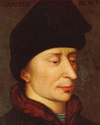|
Phlegmish posted:I absolutely get what he means. What was the source of its stability? A residual respect for the Empire as an institution? I can't give a proper answer as I have to get some sleep at this point I've been staying up waaay to long following the events in the US. But you're pretty close with your assumption, but I would replace "residual" with "enduring". Especially at the local level the Roman world had very strong insitutions and traditions that even in the West continued long after the Empire itself disappeared (often continued in the form of the Church). The new Christian-Imperial ideology that followed the recreation of the Empire along Christian lines was particularly potent and very much established that to be a Christian and a Roman were the same thing and you get a further strengthening of the connections between the local institutions and rituals that were part of people's everyday life with the Empire itself represented by the Emperor. This is also a simplified reason for it, but as said I can't really delve closer into it now. Maybe some others will expand on this or other aspects.
|
|
|
|

|
| # ? May 28, 2024 11:42 |
|
Justinian had very nearly reconstituted the Roman Empire's territory only for the bubonic plague to make its first historical appearance and wipe out good fifth of the population and wreck their economy. It's one of the huge turning points of history.
|
|
|
|
Subvisual Haze posted:Justinian had very nearly reconstituted the Roman Empire's territory only for the bubonic plague to make its first historical appearance and wipe out good fifth of the population and wreck their economy. It's one of the huge turning points of history. And a couple of centuries later, Byzantium finally wins the centuries-long war with Persia! Victory at last!! And then Islam comes along.
|
|
|
|
Re: How did Byzantium survive despite being rife with internal conflict, corruption, and a constant state of decline? There are many factors to that but Constantinople is one of the major ones, being arguably the center of the known world during that period. Whole Black Sea-Aegean-Mediterranean sea route was controlled by who controlled the Bhosphorus and Byzantine Empire held many important Anatolian ports (directly or indirectly) such as Smyrna (up until 13th Century, then reclaimed from Turks by Knight and St. John and Venice), Trebizond (until it became a successor state and conquered by Mehmet II later). Inland cities were also quite big and centers of trade like Iconium, Nicea, Prusa, and Ankyra. While "controlled" being a loose term, a good portion of that trade isn't snatched by Venetian and Genoese went to the Empire which managed to maintain a massive mercenary/local army for quite a while. Turkish popular history liked to exaggerate Byzantine Greek Fire (grejuva) effectiveness but there is some truth to that. Both as a ship weapon and siege defense weapon it was quite effective. If you have never been to Anatolia this might sound a bit abstract, due to its geological uniqueness it's quite mountainous (whether due to volcanism or plate tectonics) especially inner regions and east-southeast which made advancing Muslim and/or Turkic forces to slow down. Hell, it took hundreds of years to unify/subdue Anatolian beyliks which were like almost two dozen in number and actually more powerful than the Ottomans at the beginning such as Aydın, Karakoyunlu, Karesi, Karamanogulları (one of the fiercest rivals of Ottomans). Byzantium might have had powerful rivals and internal problems but their enemies also had enemies and historically had problems in unification. If you want to read about how a Crusaders and Frankish states survived hundreds of years in the midst of Muslim/Turkish states outnumbering them, the "The Crusades from the Eyes of Arab People" is a magnificent and insightful book by Amin Maalouf (his historical fiction books are wonderful too, highly recommended). There are some bits about how Byzantium tried to double play Crusaders vs Turks and getting pillaged the gently caress out in the book as well. Galewolf fucked around with this message at 11:43 on Jun 1, 2020 |
|
|
|
Tree Bucket posted:And a couple of centuries later, Byzantium finally wins the centuries-long war with Persia! Victory at last!! Centuries? All of these things happened in the span of a single century Plague of Justinian 541-549 Roman-Persian War 602-628 Battle of Yarmouk 636
|
|
|
|
Galewolf posted:If you want to read about how a Crusaders and Frankish states survived hundreds of years in the midst of Muslim/Turkish states outnumbering them, the "The Crusades from the Eyes of Arab People" is a magnificent and insightful book by Amin Maalouf (his historical fiction books are wonderful too, highly recommended). There are some bits about how Byzantium tried to double play Crusaders vs Turks and getting pillaged the gently caress out in the book as well. I just assume it was like a mirrored Reconquista. To a point, you want to drive out your religious enemies and claim their land for yourself, but if you are in a situation where they are neither threateningly powerful nor weak to the point of irrelevance, they might be useful allies of convenience in your realpolitik strategy. You wouldn't be in a hurry to deliver the finishing blow, since you would have to expend a lot of energy and resources while gaining little in return and perhaps exposing yourself to your co-religionist enemies. In that regard, it seems similar to how the remnants of Al-Andalus survived for several centuries after the Reconquista had already mostly been completed in the 13th century. That does seem like an interesting book. I've always been interested in things like that, as well as travelogues from non-European visitors to Europe, but they are difficult to find. The historical lack of interest in (and respect for) Europe from non-Europeans all the way up to the 19th century is something that has always struck me, contrasted with the inquisitive attitude of Europeans towards the outside world, even if they mostly used that knowledge to subjugate and exploit. It makes sense during medieval times, there is just not that much to admire (although more than Victorians claimed), but it continued during the centuries that Europe was already singlehandedly shaping the modern world, creating inventions and making discoveries at an incredible rate. I think that implies an important lesson about complacency and arrogance, one that is very much applicable to the modern West.
|
|
|
|
Well, in Ottoman case there was never a proper aristocracy to get interested in the west which they considered extremely backwards. I mean, of course the age of exploration brought much faster ways to travel in regards of sail ships and navigation but before that, it's basically a combination of imperial pride and religious dogma (Christian lands were Dar-al-Harb / Land of War, so why learn about those when you can conquer them?). There are of course people like Ibn-Battuta, Piri Reis and a couple of others traveled to western countries or North Africa / shores of Atlantic but it was never an incentive to explore because especially glory days Ottomans were sitting on the riches Silk Road and spice trade routes such as Constantinople, Aleppo, Baghdad, Smyrna, Cairo. The spice producing countries being protectorates or friends with the Ottoman Sultans also was the deciding factor. There were attempts to explore the Indian ocean but it was too late and Portuguese after the discovery of Cape Hope. There are some accounts, of course, of Ottoman ambassadors or sailors (especially from the Barbary pirate captains privateering under the protection of the Sultans) but still not nearly enough. There is another book I enjoyed reading was called "The Pashas" which was stories and memoirs of people worked in British Levant Company established in Smyrna to trade with England. A bit "popular" on the side but it was a fun read and I'm a sucker for those kind of stories.
|
|
|
|
Galewolf posted:Byzantium might have had powerful rivals and internal problems but their enemies also had enemies and historically had problems in unification. If you want to read about how a Crusaders and Frankish states survived hundreds of years in the midst of Muslim/Turkish states outnumbering them, the "The Crusades from the Eyes of Arab People" is a magnificent and insightful book by Amin Maalouf (his historical fiction books are wonderful too, highly recommended). There are some bits about how Byzantium tried to double play Crusaders vs Turks and getting pillaged the gently caress out in the book as well. I've always been a bit apprehensive about reading this book for a couple of reasons, first is the title of "through Arab eyes" whcih strikes me as a bit weird, considering that essentially none of Islamic people, apart from the Bedouin, were considered "Arab" back then, this appelation is essentially one that was created by Arab nationalism as it arose in the 19th and early 20th centuries. Also of course that the native Arab-speaking population of this era typically had very little political and military power in Islamic societies, the ruling class was typically Turkish military aristocracy, often Mamluks (that is eltie soldiers recruited from slaves). Also a thing to add that the majority of the populatiopn of the area conquered by the Crusaders was still Christian and spoke langauges like Aramaic/Syriac when outside of the cities where Arabic had become more common. A minor point though, and I can see this actually being like a deliberate chopice because maybe something called "the Crusades through Muslim eyes" maybe would put off more rear end in a top hat Westerners like the current title of "through Arab eyes" has turned off me. Then there's this from Amazon, which is from the back cover (and which I've seen before and vaguely remembered when I looked at it again now). quote:European and Arab versions of the Crusaders have little common. What the West remembers as an epic effort to reconquer the Holy Land is portrayed here as a brutal, destructive, unprovoked invasion by barbarian hordes. When, under Saladian, a powerful Muslin army-inspired by prophets and poets-defeated the Crusaders, it was greatest victory ever won by a non-European society against the West. The bolded part is the problem for me, because it seems to ignore the context of the times this happened. This was not an era of Western military or economic dominance of the world, there was no concept of this at the time and the Cruasades can not truly be viewed like a colonial/imperialistic project like the ones we later associate with the Western great powers. In fact that the first Crusade succeeded at all was pretty much a fluke (though it took part in a context of economic growth and expansions in the Christian West and is an example of that part of the world beginning to fle its muscles through expansion). I don't know, I'm probably being unfair here and am unjustifiably put off by what mostly seems like reviews or summaries and such by other people than the author. I guess for me part of it is that I've been very much interested in Islamic medieval history, which is often neglected and misrepresentend by those who write summaries but are only slightly familiar with the vaunted Islamic Golden Age (which I posit does not stand as much in stark contrast to later eras as is often presented and that there were multiple "renaissances") and the modern Middle East and project this as a lens through which they mis-represent the entirety of the history of the Islamic world. Randarkman fucked around with this message at 15:43 on Jun 1, 2020 |
|
|
|
Galewolf posted:Well, in Ottoman case there was never a proper aristocracy to get interested in the west which they considered extremely backwards. I mean, of course the age of exploration brought much faster ways to travel in regards of sail ships and navigation but before that, it's basically a combination of imperial pride and religious dogma (Christian lands were Dar-al-Harb / Land of War, so why learn about those when you can conquer them?). That makes sense. Those ingrained attitudes can be hard to change, that's just how human minds work. China, the Middle Kingdom, is probably the most egregious example (and it's extremely funny and ironic that they have now rebranded themselves as victims of Western imperialism). Generally, by the time you realize the barbarians are not 'extremely backwards' but in fact way ahead of you, it's already too late. Randarkman posted:The bolded part is the problem for me, because it seems to ignore the context of the times this happened. This was not an era of Western military or economic dominance of the world, there was no concept of this at the time and the Cruasades can not truly be viewed like a colonial/imperialistic project like the ones we later associate with the Western great powers. In fact that the first Crusade succeeded at all was pretty much a fluke (though it took part in a context of economic growth and expansions in the Christian West and is an example of that part of the world beginning to fle its muscles through expansion). Yeah. That's the problem I have with the common modern-day interpretation of the Crusades. That they were religious fanatics who committed many atrocities is obviously true, but Europeans, if anything, were the underdogs of the time, subjected to invasions and conquest. The areas that were targeted by Crusaders had been in Christian hands just a few centuries earlier, and large parts of the local population were still Christian. You really cannot look at it with anachronistic modern eyes, because the context was completely different. Phlegmish fucked around with this message at 15:41 on Jun 1, 2020 |
|
|
|
Randarkman posted:Did anyone post cool shite about Venice, because the Venetian republic was a pretty interesting place. Even though actually holding office was restricted to the nobility there was great emphasis on all citizens having a stake in the city. This for instance resulted in Venetian trades and crafts being protected and guaranteed good wages and high prices for their goods, but they were also extremely protective of their trade and craft secrets (Venetian glassware for instance was highly sought after) so the state had a ccadre of executioners/assassins on hand to track down and murder any who left the city to practice outside of Venice in case they'd leak their secrets to the craftsmen of other cities. Their voting/lottery system was really something too: The Great Council came together and put in an urn the ballots of all the councilors who were older than 30. The youngest councilor went to St Mark's Square and chose the first boy he met who drew from the urn a ballot for each councillor and only those 30 who got the word ‘elector' remained in the room. The 30 ballots were then placed back in the box and only 9 contained a ticket, so the 30 were reduced to 9, who gathered in a sort of conclave, during which, with the favourable vote of at least seven of them, they had to indicate the name of 40 councillors. With the system of ballots containing a ticket, the 40 were reduced to 12; these, with the favourable vote of at least 9 of them, elected 25 others, which were reduced again to 9 who would elect another 45 with at least 7 votes in favour. The 45, again at random, were reduced to 11, who with at least nine votes in favour elected another 41 that finally would be the real electors of Doge. These 41 gathered in a special room where each one cast a piece of paper into an urn with a name. One of them was extracted at random. Voters could then make their objections, if any, and charges against the chosen one, who was then called to respond and provide any justification. After listening to him, they preceded to a new election, if the candidate obtained the favourable vote of at least 25 votes out of 41, he was proclaimed Doge, if they were unable to obtain these votes a new extraction took place until the outcome was positive.
|
|
|
|
Randarkman posted:I've always been a bit apprehensive about reading this book for a couple of reasons [...] I was also a bit skeptical about the name of the book and expected a much different tone but the book mostly about how divided the peoples and rulers of the East and they were their own worst enemies. The second part you bolded is not too off-topic because the book includes a healthy amount of literature from that time that can be considered as "war propaganda" like WW 2 posters. How Islamic scholars and religious leaders were trying to sway the people and nobles to join forces etc. so in books context, it's not too far off. The whole book reads like a novel rather than an actual, date by date historical book (well, he is a great novelist after all) and actually challenged my views on certain subjects but I also understand how it can be off-putting to some people. I had that book for a long time but didn't get to read because I wanted to read more about Turkish ghulams/mamlukes and Seljuk beys during Crusades and thought that it focused on ethnic Arabs but there was a good amount of knowledge about what I was looking for too.
|
|
|
|
Randarkman posted:The bolded part is the problem for me, because it seems to ignore the context of the times this happened. This was not an era of Western military or economic dominance of the world, there was no concept of this at the time and the Cruasades can not truly be viewed like a colonial/imperialistic project like the ones we later associate with the Western great powers. In fact that the first Crusade succeeded at all was pretty much a fluke (though it took part in a context of economic growth and expansions in the Christian West and is an example of that part of the world beginning to fle its muscles through expansion). It's pretty hilarious that Crusades accomplished any military victories given the lack organization and also the bickering between the various Christian nation factions.
|
|
|
|
Then Europeans conquered the entire world as they gradually began to care less and less about religion.
|
|
|
|
The post-Great Seljuk Empire Anatolia & Middle East was a soup of local emirs and atabegs (highly influential caste of advisors), weakened Anatolian beys, weakened caliphate in Baghdad, Fatimid dynasty gaining power in Egypt and the Mediterranean coast (which were conflicting with the Sunni rulers of the region) either constantly fighting with each other over the scraps of Seljuk holdings, Hassasin cult assassinating seemingly invincible Muslim rulers (some cite the assassination of Nizam-ul-Mulk as the start of the decline in Anatolia and old Seljuk holdings) and many more. When the Crusades rolled in, it was pretty much a bunch of rulers holed up in their cities hoping that Franks will attack their rivals so they can swoop in to increase their power if not actively helped the "Franks". The Anatolian Turks tried to mount up some resistance but with the logistical "help" from Byzantines and their own internal conflicts ended up in crushing defeats with some victories not enough to stop the Crusades. The Crusaders were bickering group but by when they fought in an open field or during sieges they were able to pack a major punch against mostly light cavalry and auxiliary heavy armies of the Turkish princes. Kılıj Arslan of Seljuk Sultane of Rum fought a guerilla war against the Peoples Crusade but knew that he won't be able to hold against the full Crusade but still inflicted massive casualties despite losing his capital after the siege of Nicea. Once again, he got defeated by rivals in post-Seljuk civil war, which will be a trend for a long-rear end time.
|
|
|
|
etalian posted:It's pretty hilarious that Crusades accomplished any military victories given the lack organization and also the bickering between the various Christian nation factions. As they got more and more organized they actually achieved less and less success, but with the more organized Crusades that were led by kings you were much more prone to run into the problems where no agreement could be reached on was going to be the overall leader or what an overall strategy was. And in other cases Crusades were undertaken by powerful monarchs who were in open conflict with the Pope or who realized that leaving their kingdoms with large military forces was not only ruinously expensive but incredibly risky. During the First Crusade though the Muslim states were far less co-ordinated, organized or united than the Crusade forces. Galewolf went into it above. After the Second Crusade (which was a failure) is when the Crusaders began to realize that the Crusader States were doomed if Egypt and Syria were brought togerther under one ruler and so future efforts had to concentrate on preventing this. This became even more of a priority when it became ever more apparent that the Fatimid Caliphate in Egypt was rapidly falling into disarray by the 1150s and 1160s, which was incredibly worrying when you also considered that in Syria Nur ad-Din Zengi was brining together Aleppo, Damascus and Mosul. There's a rarely touched upon period of jockeying for power in Egypt between the forces of the Kingdom of Jerusalem and the army sent to Egypt by Nur ad-Din (led by Saladin's uncle Shirkuh) ostensibly to protect it against the Christians but truly to try to seize power and displant the Shi'ite Fatimid regime for good.
|
|
|
|
arslan is turksih for lion??? ASLAN IS TURKISH FOR LION????? C.S. LEWIS YOU loving HACK I'M COMING FOR YOU
|
|
|
|
Arrhythmia posted:arslan is turksih for lion??? "I found the name [Aslan]...it is the Turkish for Lion. ... And of course it meant the Lion of Judah."
|
|
|
|
Randarkman posted:As they got more and more organized they actually achieved less and less success, but with the more organized Crusades that were led by kings you were much more prone to run into the problems where no agreement could be reached on was going to be the overall leader or what an overall strategy was. And in other cases Crusades were undertaken by powerful monarchs who were in open conflict with the Pope or who realized that leaving their kingdoms with large military forces was not only ruinously expensive but incredibly risky. The other fun story how a random group of people ended all over creation was the Norman like how they ended up everywhere from Ireland to Sicily. Probably another story from history similar the Vikings and Mameluke how creating a special class of outside military forces/mercenaries plus flaunting your wealth is often a bad combination.
|
|
|
|
Arrhythmia posted:arslan is turksih for lion??? Wait until you hear what Simba means.
|
|
|
|
Free Market Mambo posted:Wait until you hear what Simba means. its a part of a swimming pool
|
|
|
|
Phlegmish posted:Then Europeans conquered the entire world as they gradually began to care less and less about religion. Europe started conquering the world well before they started caring less about religion. The whole time that they were colonizing the world, they were also fighting the wars of religion with each other over whether you could be protestant or catholic. There's a case to be made that Europe conquered the world because every other advanced civilization of the medieval period that could have discovered science & engineering got completely buttfucked by the Mongols. Or by second-order Mongol related buttfuckery, like the Seljuks being pushed west into the Byzantine empire, which had barely recovered Constantinople from the crusaders, and finally putting a stake through the heart.
|
|
|
|
ChubbyChecker posted:its a part of a swimming pool He var nog bra.
|
|
|
|
Klyith posted:There's a case to be made that Europe conquered the world because every other advanced civilization of the medieval period that could have discovered science & engineering got completely buttfucked by the Mongols. Or by second-order Mongol related buttfuckery, like the Seljuks being pushed west into the Byzantine empire, which had barely recovered Constantinople from the crusaders, and finally putting a stake through the heart. No one serious is making this case. The Islamic world was doing pretty drat well for centuries after the Mongol invasions it's reductionist bullshit to claim taht the Mongol conquests just extinguished all civilizations they conquered. Also the Seljuks were not pushed West by the Mongols.
|
|
|
|
Some good novels set in the Byzantine empire: The Golden Horn, by Poul Andersen. Forced into exile after his father's death in battle, a young Viking princeling makes his way south to the Eastern Roman Empire and becomes a mercenary fighting for the Emperor, eventually rising to command the elite Varangian Guard before returning to reclaim his lost kingdom. It sounds like the premise for a dumb GoT-style tv series but is actually all completely true. Harald Hardrada should have won in 1066 Count Belisarius by Robert Graves. The life and adventures of the sixth century general, as related by one of his devoted former slaves. Includes Belisarius, Justinian, Theodosia and limitless amounts of Byzantine skulduggery and gruesome death. Graves was a classically educated poet who also fought in the trenches during WW1; he writes about bloodshed and murder in understated, beautifully crafted prose. Baudolino by Umberto Eco. Ok this one's a bit more of a stretch, as the book's action takes you all over Europe and beyond but the narration of the story takes place in Byzantium and that's the most important thing, right?
|
|
|
|
Baudolino is quite a page turner and I remember being all 
|
|
|
|
Pistol_Pete posted:Some good novels set in the Byzantine empire: Prince of Nothing it sucks
|
|
|
|
This thread made me check out my family history a bit. We have this giant rear end old book that contains records of families, and mine is there too. Apparently one of my ancestors was appointed as a Kadi to Egypt but then got kicked out to Anatolia when Napoleon invaded and settled there (it doesn't say exactly that but the dates match?) Which kind of explains why my grandfather had some land there, why he was a lawyer himself, and why my last name is the way it is. Also my mother's side has one of the last Sheikh-ul-Islams in the early 1900's, who apparently was a Mason and died in exile after WW1. Huh. And now I'm in the US touching computers 100 years later. Life is weird
|
|
|
|
Tides of History podcast has a great part about the siege of Malta as the conflict between the Hapsbergs and their crusader pirates allies and the Ottomans with their North African pirate allies comes to a head. https://art19.com/shows/tides-of-history/episodes/42fb63bb-fd4a-42e4-9fe9-9e5708591ea0 https://art19.com/shows/tides-of-history/episodes/08a84025-842a-4b4f-a2fc-92d1d63e936e Meanwhile, the History of Byzantium podcast just hit the crusades. It really emphasizes how the first crusade, despite being a huge clusterfuck, actually showed some coordination between Byzantium and the Latin Christians, until that mess at the siege of Antioch ended the cooperation. Unlike all the later major crusades, the crusaders do not constantly complain about the lack of food, and this occurred because the Byzantines prepared supply depots for the crusaders beforehand. He also makes an argument that while Manzikert was a more important loss overall, Dyrrachium was a more brutal defeat on a tactical level. https://thehistoryofbyzantium.com/2020/04/20/episode-205-introducing-the-crusades/
|
|
|
|
Does anybody have some breakdowns on the Turks vs Magyars/Hungary? I vaguely remember that like at one point 99% of modern day Hungary eventually got swallowed up by the Ottomans and it was like that for a while. The only reason why it didn't happen sooner was a dude called Bela who was a one man army that supposedly fought off the Turks to the point there were bedtime fairy tales to Turkish children about big bad boogeyman Bela, until he got killed during a boar hunt and the resistance collapsed.
|
|
|
|
When I was in Hungary two years ago, I took a massive detour from Budapest to see where Suleiman the Magnificient died called Szigetvar but couldn't take any pictures because I literally had to run to the cab that would take me to the last train before my flight but it was quite fun moment for me. Imma try to dig up my memories and books about Ottoman Hungary in the morning.
|
|
|
|
Golden Bubble, thank you for the podcast links. Now I have even more stuff to procrastinate and not work There are some recent archealogical findings about Turkish establisment in Anatolia dating back earlier than Menzikert and like before 1040 A.D. but of course it's still too early to rewrite the books.
|
|
|
|
Hungary was a real clusterfuck for some time, first divided into three parts, and then it was caught between the Ottomans on one side, and the Habsburgs enforcing the Counter-Reformation on the other side. One of the reasons there's still a Reformed Protestant community in Hungary today is that parts of it were occupied by the Ottoman Empire during that period.
|
|
|
|
Galewolf posted:Oh Cunet Arkın, you handsome dreamboat Nonsense! That’s clearly Kürk Doüglas.
|
|
|
|
therattle posted:Nonsense! That’s clearly Kürk Doüglas. Turk Douglas
|
|
|
|
I brought it up because I do have Hungarian blood in me, but I didn't know Hungary-But-Ottoman was a thing until relatively recently. That country's history is a different thing entirely, but it does have overlap with the Turks. But it plus other research a while ago did essentially teach me most of medieval history was more or less a continental cartoon dustcloud fight for about a thousand years of various countries/peoples getting their turns in the conquest spotlight. Either being the ones doing the pillaging or being the ones pillaged instead, some relatively more so than others.
|
|
|
|
Geographically speaking, Hungary is in a large, accessible basin, which is why the Magyars ended up there in the first place. Of course, that meant that they in turn were alluring targets for the Mongols and the Ottomans.
|
|
|
|
Randarkman posted:Centuries? All of these things happened in the span of a single century The Roman's had been on and off fighting the Persians since something like 50BC, when they were the Parthians and you're being unusually disingenuous in glossing over that.
|
|
|
|
Weka posted:The Roman's had been on and off fighting the Persians since something like 50BC, when they were the Parthians and you're being unusually disingenuous in glossing over that. I was not glossing over anything. I only linked to the last great war with Persia because that was what was mentioned in the post I replied to. What the gently caress kind of reason would I have to be glossing over that?! Parthians weren't Persians.
|
|
|
|
Galewolf posted:Baudolino is quite a page turner and I remember being all One hell of a book.
|
|
|
|

|
| # ? May 28, 2024 11:42 |
|
Randarkman posted:I was not glossing over anything. I only linked to the last great war with Persia because that was what was mentioned in the post I replied to. What the gently caress kind of reason would I have to be glossing over that?! Sorry I phrased that in a needlessly hostile way. When the Sassanids took over most of the upper nobility was the same Parthian families. You can frame the change as dynastic as easily as you can the end of one state and the beginning of another. What do you mean by Persian? As far as I can make out the Parthians were another Iranian tribe who migrated into the area and leant heavily on Achaemenid traditions as a source of legitimacy.
|
|
|

























